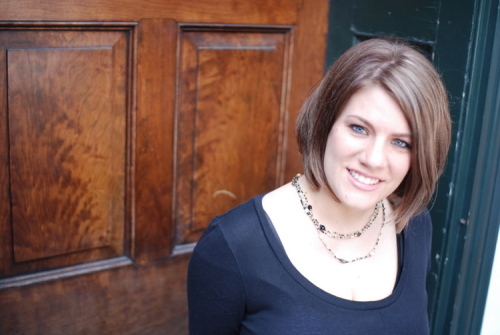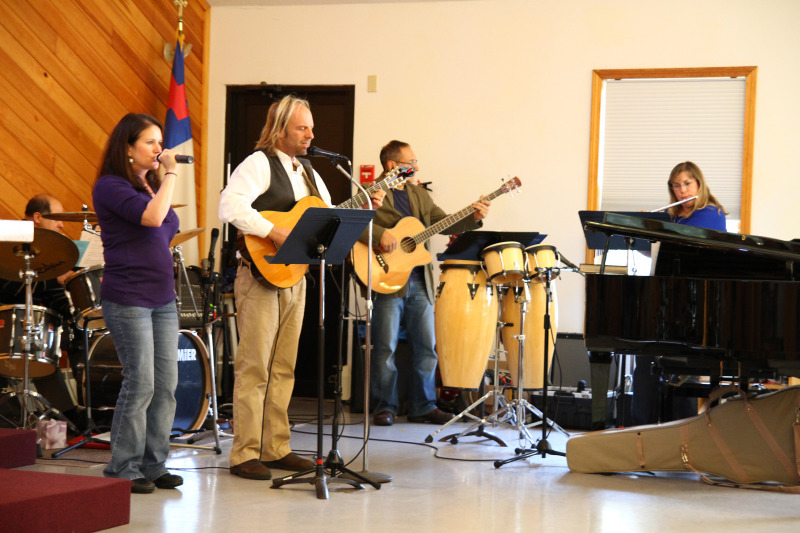What I Read on my Summer Vacation
The two books came to me from two very different sources, and while I had no intention of reading them back-to-back - that is what happened.
Reza Aslan's narrative of the life of Jesus titled Zealot, and Lesley Hazelton's The First Muslim a narrative of the life of Mohammed. Aslan's book came to my attention, as it did for many via the remarkably bizarre television interview on Fox Television. I say bizarre, because the anchor so embarrasses herself and the viewing audience by chastising Aslan for writing a book on Jesus. "How can you, a Muslim, write a book on Jesus?" she says. You can view it here. It would have been one thing if Aslan had written a book with a Muslim perspective on Jesus, i.e. making him a prophet in a long line of many prophets. That would have been more controversial. But, that is not what the book Zealot sets out to accomplish.
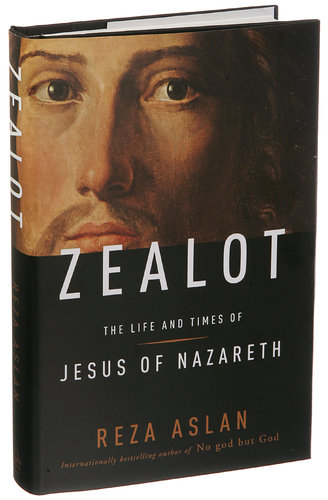 In essence, what Reza Aslan has done is take the vast and growing scholarly research of the last century on the quest for the historical Jesus, and put it into a readable and mostly complete single volume. What you find here in an accessible format is what most every graduate of a theological seminary has digested in his or her New Testament class. So from that, point of view, Aslan is not all that radical. His greatest gift is to pull together the work of John Dominic Crossan, John Meier, Raymond brown and Marcus Borg, and put together a single volume that your average adult could read. He has done a good job, and the volume reads almost like a novel. It's a read, as they say.
In essence, what Reza Aslan has done is take the vast and growing scholarly research of the last century on the quest for the historical Jesus, and put it into a readable and mostly complete single volume. What you find here in an accessible format is what most every graduate of a theological seminary has digested in his or her New Testament class. So from that, point of view, Aslan is not all that radical. His greatest gift is to pull together the work of John Dominic Crossan, John Meier, Raymond brown and Marcus Borg, and put together a single volume that your average adult could read. He has done a good job, and the volume reads almost like a novel. It's a read, as they say.
However, much of what is written about in the quest for the historical Jesus has not made it's way into the consciousness of your average person in the pew. Despite my own efforts for 25 years as a parish pastor, I still lament the lack of basic understanding as to how Lutherans in particular, and most modern Christians in general read the scriptures. Therefore, if someone picks up this book and reads how only two of the four gospels contain a narrative of the Christmas stories, and Aslan makes the strong case that these were later additions by the early church - well, you might have some outraged parishioners knocking at your door demanding to know why Santa Claus has been taken out of Christmas.
I write this as a warning to those thinking they'll download Zealot onto their Kindle and dive in. You may be in for a shock. While Aslan does not dispute the healing or even the miracle stories, he lays out a case for a clear distinction between the Jesus of history (lived in Nazareth, raised as a peasant, rooted in 1st century Judaism) and the the Christ of faith (recast by Paul, narrated by John as the incarnate Word). Perhaps one could even hear Martin Luther rolling over as Aslan makes a strong case for James, the brother of Jesus, and his emphasis on Faith without Good works is Dead, as the essence of what Jesus really intended. No doubt there are flaws in Aslan's book, and others have written about them, such as Yale's Dale Martin, but the book gets it mostly right. But, be prepared, to be disturbed, confused, and knocking on your pastor's door or email inbox with questions.
What Aslan has done for Jesus, Lesley Hazelton has done for Muhammed in her equally fine book The First Muslim. I came across this book while searching through a series of TED talks. Since TED usually does not cover religious subjects, I was surprised when I found her 17 minute talk on the value of doubt and it's integral role in faith. Her talk is here.
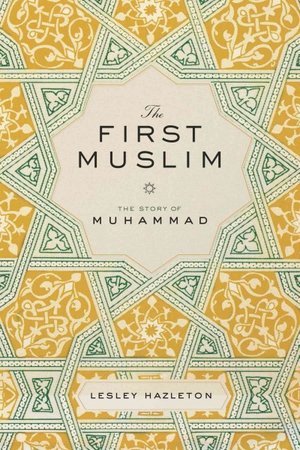 My reading in Islam is dramatically more limited. But I have attempted in recent years to explore and understand this religion. Most significantly for a series called "Understanding Islam" that I assembled for my congregation in Rhode Island. Admittedly the best part of that series were not to be found in my presentations, rather in the dialogue that began when a Pakistani physician, a Syrian civil engineer and an Egyptian professor showed up in response to a tiny newspaper article announcing the event. The four of us sat for three Wednesday evenings and discussed Islam and Christianity.
My reading in Islam is dramatically more limited. But I have attempted in recent years to explore and understand this religion. Most significantly for a series called "Understanding Islam" that I assembled for my congregation in Rhode Island. Admittedly the best part of that series were not to be found in my presentations, rather in the dialogue that began when a Pakistani physician, a Syrian civil engineer and an Egyptian professor showed up in response to a tiny newspaper article announcing the event. The four of us sat for three Wednesday evenings and discussed Islam and Christianity.
Lesley Hazelton has done for readers interested in the origins of Islam, what Reza Aslan has done for the origins of Christianity. The First Muslim narrates the story of Muhammad from orphaned boy raised by bedouin shepherds through receiver of divine revelation to leader of an emerging nation. She carefully separates out the historical and biographical from the later additions of tradition, in much the same way as Aslan has done for Jesus. There are some fascinating parallels in these two books, for instance one can see the strong emphasis in both Jesus and Muhammad for correcting the dramatic gulf between the rich and the poor. Both men saw this from early life experiences where those in power had vast amounts of wealth compared to those in abject poverty.
Hazelton is a fine writer, and makes this the most accessible of all the books I have read on Islam. She is not without her critics who have reviewed the book less favorably. But, again, I would argue her purpose is to be as true to the research as possible, while maintaining an eye on composing an accessible narrative.
-
Why were these two books brought to my attention at the same time? No, I am not suggesting that I intuited some revelation, divine or otherwise. I am seeing a connection and a problem, as well as an opportunity.
The connection in both of these books is an extension of the Bultmanian demythologizing project. Rudolf Bultman was the German biblical scholar who stripped all the myth, fantasy and fiction out of scripture. The effort was to boil it down to its core essence. Both Aslan and Hazelton have taken the scholarship of their respective fields and written a book that is fairly easy for a modern educated adult to digest. We are left with a good story of some amazing men who quite possibly had some kind of divine connection/revelatory encounter, and endeavored to right the wrongs of the social injustices of their times. If that is the case, then why bother following one or the other for that matter. (Similar books have been written about the Buddha and other religious figures) This problem is why we have seen a dramatic increase in fundamentalism in all religions around the world. "Just get back to the fundamentals of our faith. Don't engage in scholarship. Read the words as they are written before us and apply them" These are among the statements and attitudes. One can understand why this response has such an appeal.
But, ignoring the scholarship, not using our own (I believe God given intellect) to sort through the matter, would be a greater injustice. Among all the themes of this blog, I'm trying to encourage a way through this 'stuff' - a public wrestling with the questions, doubts and wonderings of a modern or post-modern guy. What does it mean for me as a Christian to embrace scriptures that are the inspired word of God (note I did not say inerrant word of God)? What does it mean that I live in an age of science where the depths of atoms and the expanse of the universe are vastly more significant than when Isaiah was stomping around ancient Israel? What does it mean to be a follower of a first century peasant who was so outraged by the economic inequalities of his time that he was willing to openly challenge the leadership of his religion, and I live in a time of equal, if not greater inequalities? What does the newfound 'science' of psychology teach us about the power of myth, meaning and dreams, both now and in the time of Joseph?
If you want quick short, matter of fact answers, you can check last night's scoreboard to see how the Red Sox faired. While I'll look for that information on ESPN.com, this is the place to explore, in the words of the unknown author of the New Testament book of Hebrews, 'faith is the assurance of things hoped for, the assurance of things not seen.'
Bishop to Bishop
 Mike Rinehart, Bishop of the Gulf Coast Synod is about as active as any of us. In addition to bishoping between New Orleans and Houston, he's got a family, blogs regularly at BishopMike.com, and rides a motorcycle. He also is an eager learner, and enjoys interviewing people. Wow! Great idea. You can listen to his interviews and podcasts at his site here.
Mike Rinehart, Bishop of the Gulf Coast Synod is about as active as any of us. In addition to bishoping between New Orleans and Houston, he's got a family, blogs regularly at BishopMike.com, and rides a motorcycle. He also is an eager learner, and enjoys interviewing people. Wow! Great idea. You can listen to his interviews and podcasts at his site here.
Mike chose me for a conversation last week while at the Church Wide Assembly. Click below to have a listen, it's about 10 minutes in length.
By the way, I'll be on vacation til Aug 29, so don't expect much activity here until then.
The interview can be had here.
What Happened in Pittsburgh?
What Happened in Pittsburgh?
On Wednesday of this week, over 900 people, nearly 60% of them attending their first Church Wide Assembly, came to Pittsburgh with the honest expectation, myself included, that we would re-elect Bishop Mark Hanson for a third term as Presiding Bishop of the Evangelical Lutheran Church in America. But, that did not occur. What happened?
On Wednesday we elected Bishop Elizabeth Eaton as the new Presiding Bishop, she is the Bishop of the Northeast Ohio Synod on a final ballot of 600 votes to 277 for Bishop Hanson.
I do believe that there were multiple forces at work here. The first is our North American preference for the new. There was a time when baseball coaches could stay with a team for decades, but the era of Walter Alliston, Tommy Lasorda, Joe McCarthy, Casey Stengell is no more. We tire of our US Presidents in their second term, regardless of political party. Some of what I was hearing in Pittsburgh reflected this view. In other words, it was not Mark Hanson in particular, he is well loved, it was the idea of a third term. As one person said to me, “I am a believer of allowing new leadership to regularly come forward.”
As the days unfolded and the ballot results were announced, there was a spirit of ‘something new’ in the air. This is hard to explain. There was no campaigning, no strategy, no back room deals. But, as the second ballot announced who had decided to stay on the ballot, the men stepped back, and the women did not. There were eleven male bishops in the first ballot. We all stepped back and removed our names from the ballot. We did this not for some planned strategy, but, candidly, none of us sensed a call to serve as Presiding Bishop. Yet, it seemed the Spirit was speaking to the women.
Elizabeth Eaton spoke with clarity and candor. Her sense of humor was evident. She spoke theologically, but in a way that was down to earth. She reached out, as is her style, to the broad diversity of our church. It became clear throughout the day, that Elizabeth was the right person for the call. In fact, the votes were revealed that she was the obvious choice. The election was not even close, she actually almost won on the fourth ballot. The Holy Spirit was speaking loud and clear.
I believe she will be a fine servant. She understands the landscape of life in our congregations and culture. Elizabeth is a strong leader, and I look forward to her serving as our Presiding Bishop.
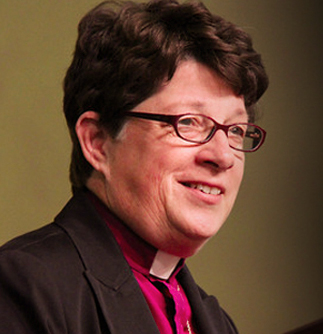
Bishop Eaton is a graduate of Harvard Divinity School, and attended University Lutheran Church in Cambridge, MA for a period during her studies.
Rev. Elizabeth Eaton elected Presiding Bishop of the ELCA
I am working on a more detailed post, but wanted to get this press release out to all of you.
(RNS) The Evangelical Lutheran Church in America on Wednesday (Aug. 14) elected the Rev. Elizabeth Eaton as the denomination’s first female presiding bishop. Eaton received 600 votes against incumbent Presiding Bishop Mark Hanson, who received 287.
Eaton, the current ELCA bishop of the Cleveland-based Northeast Ohio Synod, is married to the Rev. Conrad Selnick, an Episcopal priest.
A native of Cleveland, she received a master of divinity degree from Harvard Divinity School.

Elizabeth Eaton was elected presiding bishop of the Evangelical Lutheran Church in America. Photo courtesy ELCA
“We are a church that is overwhelmingly European in a culture that is increasingly pluralistic,” Eaton told the ELCA Churchwide Assembly in Pittsburgh shortly after the election.
“We need to welcome the gifts of those who come from different places, that is a conversation we need to have as a church.”
Hanson is credited with leading the nation’s largest Lutheran body — with more than 4 million members in 9,638 congregations — with a steady hand during turbulent times.
The election was a surprise to many, as Hanson was expected to win an unprecedented third term after 12 years in office. Hanson was the third presiding bishop in the denomination’s history; three of four finalists for the position were women.
“When I stood before you 12 years ago, I told you this is not an election won, this is a call received. And now this call has been extended to Bishop Eaton,” Hanson said at the assembly. “This is a humble and a holy privilege to serve the gospel as the pastor of this whole church.”
Eaton joins Episcopal Presiding Bishop Katharine Jefferts Schori, who in 2006 became the first woman to lead a church in the worldwide Anglican Communion. The two churches share a full communion agreement that allows shared clergy and joint ministry.
Eaton will serve a six-year term beginning Nov. 1.
What is happening in Pittsburgh?
I am sitting in the convention center in Pittsburgh during the election process for our Presiding Bishop. There are, effectively, four candidates on the ballot at this time. Bishop Hanson, Bishop Jessica Crist, Bishop Eaton, Bishop Svennungsen. Three women and a man. As the results have been unfolding in these days, and it became evident with the results of each ballot that this was not going to be an automatic reelection for Bishop Hanson, the conversations are coming forward around the question listed above.
My sense is that a few things are going on? First, we are in a cultural and societal upheaval that is impacting all aspects of life. This is not the world any of us grew up in. Rapid and earthquake-like shock waves are unfolding across education, government, psychology, religion, economics. EVERYWHERE. That is a very important factor, that should not be ignored.
Second, we live in a time of impatience with leaders. Let me clear, this is not a critique of any one person or leader. Rather, it is a factor. In the United States the public becomes tired of its leaders quickly. This has been evident with our public view of United States Presidents. Today, there is already talk of 2016 presidential elections, yet President Obama has only just begun his second term.
Third. One person approached me and said, "What do you know about this strategy of having all women candidates as the alternative?" I immediately said something to the affect of, first off that is not what is happening. There is no strategy. I think what is going on here is the emerging collective feminine voice. Notice that there were many men who were in the top 20' myself included. All of the men stepped back. Why? We each have our own reasons. Bishop Mike Rinehart expressed thoughts that I resonate. For me, I have just begun to serve in New England. I'm having a good challenge and a good time. Regardless of our various reasons, some eleven different men stepped back. Yet, the women did not. They allowed themselves to be available for the call. There is much more I could write about this, but the speeches are about to begin, and I want to be in discernment about this process.
ELCA Churchwide Assembly Day 1
Our New England Synod Communications Guru Andy Merritt is with the 15 of us from New England attending the church wide assembly here in Pittsburgh. He put this short video together and stayed up late last night so we could get it out to you. It's on the synod website, but I am adding the link here below for you.
What I've learned after 144
No, this is not my age.
As I prepare to hop on a plane to Pittsburgh for the ELCA Churchwide Assembly, followed by two weeks of vacation on Marthas Vineyard with the President, I thought I'd stop in with a brief report of my time as nearly a year as Bishop of the New England Synod. 144 is the number of congregations I was able to visit in my first full year. There are 184 congregations of the New England Synod, and it is my intent to get to the rest of those congregations in the coming year.
 These visits have allowed me to connect with the vast majority of our churches and people, as well as clergy along with rostered leaders. I tell people that it is the best part of my work in this first year. And that is true, therefore, it is my intent to continue visiting, preaching and being a mobile bishop.
These visits have allowed me to connect with the vast majority of our churches and people, as well as clergy along with rostered leaders. I tell people that it is the best part of my work in this first year. And that is true, therefore, it is my intent to continue visiting, preaching and being a mobile bishop.
In addition, my staff of Associates all live throughout the New England region, and they will also be on the road making connections in the regions they serve.
What have I learned in these 144 visits to congregations, plus Camp Calumet, Hospitals, University campuses, etc?
I could make a list, and come up with a David Letterman top 10, but today, I'm less interested in a series of bullet points. No, I'm looking for a common thread. The one overarching Hegelian theme that ties it all together. I thought I had it, but then a series of conversations last week, made me realize, nope that's not it either. Then last night, a Baptist preacher brought it all home to me. My translation of his delving into greek origins of words, history of Tyndale's english translation, and Biblical epic narrative of first century christianity:
People don't want church anymore, they want authentic community.
Church is a bad word for most people, but authentic community represents our deepest human desire.
While a few of you may be disturbed by that statement, most of you who read this blog know what I'm talking about. Many of us are tired of what the word 'church' represents - crumbling buildings, people arguing about finance and membership, food fights about non-essentials, idolatry, performance anxiety (as in putting on the happy face, clothes, etc in order to measure up).
Yet, in the words of Brene Brown, "everywhere I go in my consulting with churches people talk about how all these people are leaving the church, but everywhere I go in my research work all I meet are people who all they want to do is talk about spirituality."
Authentic community, a modern phrase that seeks to capture the original intent of the greek word Ekklesia, is what people long for in their lives. Opportunities to grow in faith, in connection with others, in a sense of being recognized and honored for the flawed and imperfect people that we are - that my friends is what Jesus Christ is all about. (I'm starting to engage my preacher voice in my head) So people want church, but not church. They want ekklesia (gathering, assembly, authentic community) but not church (small mindedness, cheap grace, etc)
What I've learned after a 144 church visits is that people don't want church as a place to go and do things, they desire a church that is a gathering of people who will be with them on the journey of life. That's our goal, and that is Jesus goal.
It will not be easy to get there. Why? because, as much as we desire it two things stand in our way. One is external. We have structures that actually impede movement toward this goal. The other is more challenging, because it is internal. As much as we desire this authentic jesus community, we also are so frightened by it that we sabbaotage any effort. It will not be easy, but it is where God is calling us. But if we are willing to risk, be vulnerable and laugh along the way, I believe we can move toward being ekklesia - a gathering of disciples living in authentic community for the good of the world.
How I'd change seminary education - Part 1
This is the beginning of a series of blog posts, that will eventually end up as a paper or article on the subject. I'm laying these thoughts out here in bits and pieces, kinda like post it notes on the dining room table. Later I'll rearrange the order and edit and such.
While enjoying a mocha frappucino (did I spell that right?) at Starbucks, after my doctor called and said my cholesterol numbers were good, I engaged in conversation with one of our pastors. We were discussing the state of the Christian faith, the ELCA, frustrations with parish ministry. Then he said, "I love the church, but seminary didn't really prepare me to lead the church. I was told if I preached the gospel, loved the people and was faithful, I would succeed as a pastor. But that's not enough"
I graduated from seminary 25 years ago, and said the same thing. I have colleagues who graduated 35 years ago and said the same thing. Now I'm hearing the same thing from pastors who graduated five or ten years ago. What's going on here?
First off, the broad consensus of pastors I talk to is that seminary education is an excellent education in the areas of biblical studies, church history and theology/ethics. I've not heard a single criticism of those fields of study, and many pastors have said to me, "that is my most treasured learning from seminary." So, I want to begin with a strong heart, head and soul affirmation of that aspect of seminary. Later I'll detail more on the positives, with ideas on how to take that strength and leverage it.
But, leading a congregation requires other gifts that need addressing. Today, I'll speak to one area by way of a book review.
 John Kotter's Buy In, is the latest from the author in his Leading Change series of books. Kotter taught at the Harvard Business School for years, and then discovered his research was in such demand he could run his own little institute, and probably make a ton of money consulting with corporations.
John Kotter's Buy In, is the latest from the author in his Leading Change series of books. Kotter taught at the Harvard Business School for years, and then discovered his research was in such demand he could run his own little institute, and probably make a ton of money consulting with corporations.
While the whole Leading Change series is worth digesting, Buy In, represents a key component of leading a congregation. This book describes the process whereby people come to hear of a new idea and move from suspicion to not only acceptance, but complete 'buy in' and ownership of the idea.
Kotter's method is soundly and honorable consistent with a Christ like approach to leadership. It's not manipulative, and it honors the other with respect and dignity.
Much of what a parish pastor is called to do in this new emerging world of mission is to secure buy in from people for some new way of doing ministry. That is not an easy thing to do. It is also not an exclusively church related challenge, which is why Kotter is in demand by major corporations all over the world. Almost every industry that I know is under going turmoil, and needs to move in new directions.
Teaching the process for leading change in congregations should be the number two priority in a seminary education, right after the theological foundation. Pastors are entering congregations that at best are aware of a need to practice ministry in a new way, or at worst are in complete denial about the reality of the situation around them. There is a clear spectrum from one degree to another. The major task of a pastor in today's congregations is to define reality, gather a group of motivated persons, collectively work with that group to seek a God infused next chapter, and then work to get as many as possible (you don't need everyone) to buy in and move toward that new chapter.
I'll be honest. This is extremely difficult work. As I point out in the sermon below, parish ministry is one of the toughest jobs in America today. But, we owe it to the next and maybe even the current generation of leaders to give them the tools to have a better shot at it. Leading change can be taught. Yes, it must also be learned while doing, but laying a foundation in seminary will provide resources for our congregations.
I should end this post with some clarifying points. 1) Seminary education is vital to our church, and I am an avid supporter. 2) The love of learning and exploring theology and faith is a gift from my own seminary education that I will forever treasure. 3) I want a robust seminary education to be a part of our pastors preparation for ministry.
I'll write more on this subject as the post it notes in my brain get going.
The Role of a Pastor - A Sermon Preached in Kingston, RI
Below is a link to an audio recording of my sermon preached this past week at Lutheran Church of the Good Shepherd in Kingston, RI. The congregation is currently in the call process. I was invited to lead worship, preach and answer questions about the process for seeking a new pastor. I recorded the sermon with the intention of making it available to everyone, especially congregations in call process.
Here is the link ---> Click here
A new window in your browser will open, and it should start to play automatically. If not, click on the play button, a little triangle on the left side. The sermon runs 19 minutes in length.

Our Own Little Universe
I am working on another post, "Toward a Mature Spirituality", based on my weekend retreat with Dr. James Hollis, but that's still maturing. Instead, you get this...
Tonight, I realized how myopic I've gotten with this whole conversation about worship and church, see my post below in response to Racel Evans. I suddenly found myself convicted as I sat before the magic screen today and watched this interview with David Carr on Charlie Rose. I've been a David Carr follower ever sense that amazing PBS special on the radical changes in the newspaper industry, Page One. Since I'm a former journalism major/video hack/photographer/drama queen college guy, I still have a fantasy of being the Guy Noire of some newspaper. (OK, that fantasy has now dissappeared, mostly)
The interview runs 25 minutes, but I encourage you to set aside the time to digest it. Around the 18 minute mark, David says, "we are going to be able to program our own little universe."
Program our own little universe? I heard that line and thought, HOLY MOLY BATMAN, what's this mean for the faith, all faiths? I've long maintained that our greatest competition in post-modern society has been Hollywood. No, I'm not one of those, Hollywood is destroying the family values that made this country great, kinda preachers. Rather, I'm thinking about the power of narrative as the driving force in human consciousness, from those cave drawings on the wall 10,000 plus years ago, through all the great literature, both sacred and profane, to the modern era. Narrative is what shapes us and molds us as a species.
The Bible contains amazing narrative and Moses, Ruth, David & Bathsheeba, Job, Jesus. We kill the Bible when we turn it into a constitutional document. Those stories have power, because the narratives sink deep into our souls and do work over the long haul. As a Christian, I am partial to the stories of biblical literature. But, that doesn't mean I'm also not fond of the narratives of Homer, the Buddha, Native American mythologies, Shakespeare, Zora Neale Hurston and Flannery O'Connor.
The new narratives are being written by Hollywood. George Lucas did more to interpret Zen Buddhism and The Hero with a Thousand Faces to North America through his Star Wars movies, than any great lecture series. Francis Ford Coppola did more to interpret the Vietnam War and Joseph Conrad's Heart of Darkness in his epic Apocalypse Now than any Time magazine article. Juno was a wonderful movie that balanced out the vapid portrayal of teenagers, with a reminder that the youngest among us can rise to a level of maturity, despite our best efforts to reduce teenagers to the lowest common denominator.
If David Carr is right, and I suspect he is, we will, and maybe already are, programming our own little universe, what is the implication for faith, public civil discourse, human community? Is part of our increasingly divided politics a result of the fact that many of us are only talking to like minded people? Are traditional forms of religion and faith being squeezed out of our lives because we now get our life shaping narrative from the box? Are the stories being told in "House of Cards", "Lillyhammer" and "The Sopranos" more interesting, more entertaining than Jacob & Isaac? Where does the equal need for human community come into play in this era of home movie watching?
I want to suggest that the church, and churches consider diving into this realm. No, we cannot produce Hollywood style films, nor should we attempt to produce some of those vapid sugar-coated Christian tv shows. I'm thinking of embracing "Breaking Bad" and connecting the narrative to some of the equally "Breaking Bad with Cane and Abel" scriptures. In the interview above, Carr describes a series of interesting protagonists in modern Netflix films. Can we engage these characters with some of the darker sides of those scripture characters.
I wonder if the church has sugar coated the shadow side of our biblical characters, and thus washed them clean of their, well, humanity. We embrace a theology of saint and sinner in each person, so let's explore that theme with Don Draper, Francis Underwood and Nurse Jackie.
My thought upon beginning this blog post, was holy cow Batman, we are debating worship styles, when the rest of the culture is programming their own universe and we are not even a part of the conversation. So bag that Bible Study you just bought from the church publishing house, and get a stinkin' $8 per month Netflix subscription, invite people over for some theological brewing on the narratives glowing in everyone's living room. There's a lifetime of material, and I suspect that over time, the conversation will mature and people in your little group will open up, and the narratives of their own lives will come forth. Then you'll be on to something as film, scripture and life dramas collide.
* If this post has a higher than normal punctuation, spelling and grammar error quotient, it's cause I was typing so fact, cause I wanna head downstairs form the next showing of "Orange is the New Black,"
Is Rachel Held Evans right?
One of the more articulate spokespersons for a new generation of Christians is Rachel Held Evans. She is a 30 something, 32 to be exact but my mommma told me never to give away a woman’s age. She's an evangelical christian, sorta kinda, drop out and drop in on the church type. Hey, I got no problem with that, as I myself was an outsider for 21 years, and have wondered for the last 33 if I really do belong here. This morning I did, but this afternoon, well, I just wanted as much distance as possible. She is smart, savy, funny and has her pulse on the latest and greatest. She’s written two books, and blogs frequently here.
Today’s article on CNN.com “Why millenials are leaving the church” is getting a lot of thumbs up on social media. It is definitely worth a read, and besides CNN will appreciate the fact that you clicked through to it, as the metrics will mean more advertising revenue. I enjoyed it so much I read it three times.
But then I started seeing some of the responses on Facebook and Twitter. While most were harmless or bold “likes”, every once and a while I saw a post that made me realize the profound truth of the author Anais Nin. She said, “We don’t see things as they are, we see things as we are.”
I saw this most clearly in this post on Facebook. “Evans is so right. I’ve been saying for 30 years that keeping liturgy the same is what will bring people back to church.” Hmmmm, really? Is that what she is saying? Yes, she does indicate a preference in her generation for liturgical forms of worship. The exact quote is: “Many of us, myself included, are finding ourselves increasingly drawn to high church traditions – Catholicism, Eastern Orthodoxy, the Episcopal Church, etc. – precisely because the ancient forms of liturgy seem so unpretentious, so unconcerned with being “cool,” and we find that refreshingly authentic”
But, my guess is that Held would also agree that there is no one size fits all for millenials or any generation. I fear that my friend who posted on Facebook might be suggesting that a return to a certain form of liturgy is the key answer, the magic clue, the easy way forward. I would argue that what this generation or anyone outside or on the margins of the church is really attracted to can be summed up in this statement by Evans: “We’re not leaving the church because we don’t find the cool factor there; we’re leaving the church because we don’t find Jesus there.”

I’ve been to lots of different churches, both recently as a newly elected bishop, but also over many years as a curious Christian seeking out an authentic way to worship in this empire context called North America. I’ve been in amazing worship settings in Pentecostal charismatic settings with hands held high, as well as Lutheran and Greek Orthodox settings that were truly magnificent magnificat. I’ve also been in the most vapid and pretentious worship services in those same or similar traditions. I’ve connected with God while worshipping at Willow Creek, and been equally repelled in the same setting a few years later.
As a pastor, when I lived in New York City I embraced the high liturgy of Lutheran worship, because the context was culturally and spiritually appropriate. But, I also worked to add a more relaxed worship service with musical rhythms of rock n roll music, because there were those in our neighborhood in Brooklyn who connected with God in that style. In Rhode island, we did what some people call contemporary worship, but I like to refer to as culturally appropriate worship. Yes, I wore blue jeans once for a drama, but most of the time I dressed like I was right off the pages of Land's End, not because I wanted to be cool, but because that's the way I like to dress.
In our New England Synod, I’ve witnessed authentic and powerful worship with jazz music at Zion Lutheran in Pittsfield, MA, formal liturgy and beautiful organ music at Trinity Lutheran in Worcester, MA, and a more relaxed guitar and drum driven worship at Sanctuary, Marshfield, MA. I've danced with the Puerto Rican rhythms of spanish language worship at Iglesia Luterana and Gloria Dei in Providence. I cannot believe that God wants me to pick one of these as the 'right way.' The common theme was an authenticity, a hard to describe connection with the numinous, and well, a hard to describe match between the people in worship and the leadership.
I’m going to invert Evan’s statement from above and rephrase what I see. “People are returning to churches because they find Jesus there.” And, I don’t mean that statement in some prefab everybody’s saying “Jesus loves you” kinda way. What I see is congregations that are seriously attempting to engage their communities are being Jesus communities. To quote Bonhoeffer: “The Church is the Church only when it exists for others...not dominating, but helping and serving. It must tell men of every calling what it means to live for Christ, to exist for others.”
These churches are making a difference in the lives of people who don’t frequent the door of a church building. They are serving meals, raising funds to keep swimming pools open in the city in summer when municipalities are fiscally constrained, they start AIDS ministry, they are starting medical clinics, they are providing pro bono legal services, they are reading to children in first grade. AND THEN They are connecting worship to that Jesus servant lifestyle in a way that speaks to the pain and suffering of human life. They are not providing sermons on 6 points to raise your stock portfolio, but they might do a series on 12 steps of AA and Christianity. They are telling biblical stories of Job, and Hosea, and Peter, and connecting them to the suffering of life, and the peculiar way inwhich God enters into that pain, not to fix it, but to somehow be present. In that presence, there is a redemption. After all who hasn’t wondered why is God punishing me like Job, or why has my spouse run off with another (Hosea), or denied the very existence of God/Jesus (Peter). These are not old stories, these are living stories that are alive today, its just the names are changed.
My point, if there is only one here, is to encourage us to look, not for easy answers. (Fix the worship, fix the Sunday school, fix the way we receive the offering) No, the answer is to embrace the challenge, and realize that authenticity is really really hard work. It is marathon work, not sprinters work. In a person it takes a lifetime of community, honesty and vulnerability. In a church, it’s, well, it’s even harder, cause you are working with people. Some people want to grow, some people think they wanna grow, some people think they’re done, and most people are doing the best they can.
Here’s to the journey, and the reminder that most of all of us are doing the best we can. Somehow, that's an attempt at Grace.
My Day at RCDC
Today, I was able to join the campers and staff of the RCDC. Resurrection Connection Day Camp. This is part of Camp Calumet's summer ministry of Urban Day Camps. Today the camp was at the beach, which is where I found some wonderful ministry - and a chance to cool off from this heat wave. Thank you Camp Calumet for helping making these urban day camps possible.

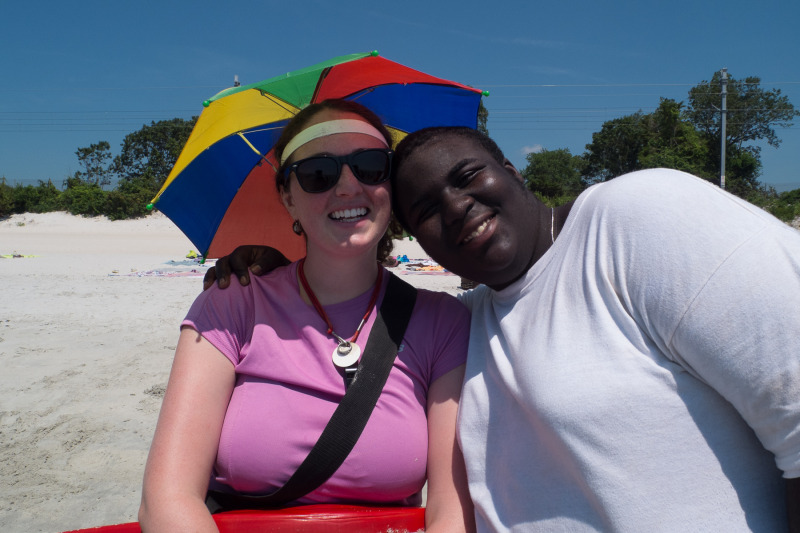

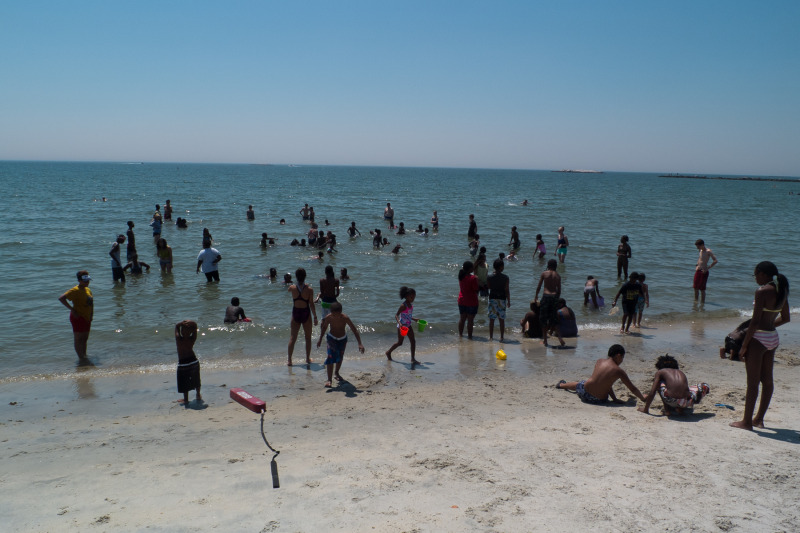

Richard Rohr helps us understand Prayer
I continually find Richard Rohr to be so helpful. Here he describes a new/old way of understanding prayer.
A Baptism makes me miss the Parish
What do you miss about congregational life, now that you are a bishop?
I have been asked this question only two or three times over the past year, but each time, it has stumped me. I haven't known how to answer the question - and yet, it has gnawed at my soul over time. Today, in the midst of this sweltering heat, on the way back from Immanuel Lutheran Church, in Meriden, CT, I had time to think through this question. So, what do I miss about being a parish pastor?
# 1 - Baptisms - I realized how much I enjoy conducting a baptism. Today, Pr. Chris McKinstry and his wife, invited me to baptize their son Liam. Chris wanted to be Dad for the baptism, as opposed to trying to merge pastor role and parent role. First, hats off to Chris for seeing through the clarity of role definition in his family. That's a sign of maturity, I admire. Second, thank you, thank you, thank you. What a joy to baptize your son! It brought me back into congregational life, and the ritual of being with people and communities of faith as they celebrate together. I have missed this aspect of my work now, and I thank you again for rekindling that joy in me.
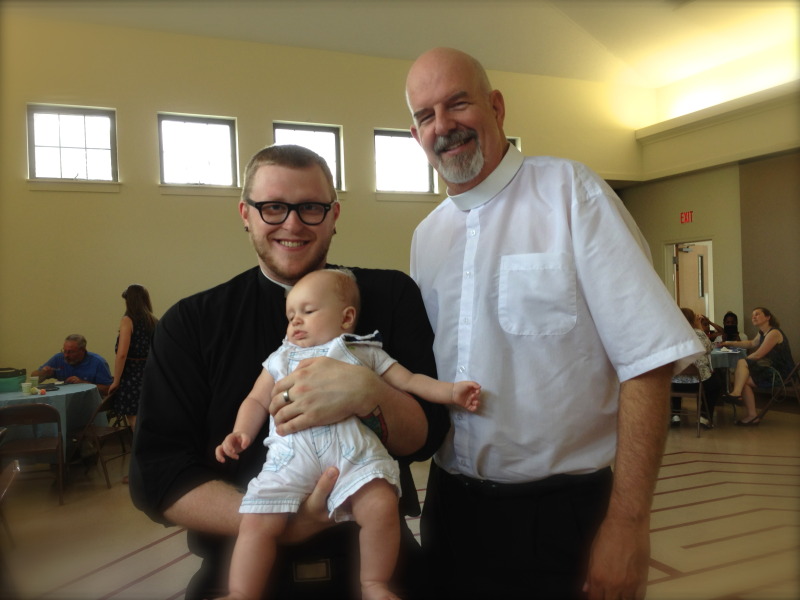
# 2 - The Rhythm - There is a rhythm to the life of a parish pastor. It's more than the annual cycle of the church year, it's more than the week to week routine - in other words, I'm not referring to the tasks of ministry. No, I think what I miss is that sense that you are walking on a road of God's Grace, and that above all your calling is to be the wholly person in the community. Yes, I intentionally spelled it wholly, not holy. In the Anglican tradition, the priest was called the Parson. Somewhere in the origins of that word is a root that is related to being the Person. I've thought of this as the Parson is called to be a whole Person in the community.
Walking, driving, living, eating, playing in a community as the person charged to be the one who is called to be whole, to be the one whose job it is to be working on Self. Yes, I'm thinking both psychologically and spiritually here. I do not mean spending time naval gazing. Rather, I’m referring to the hard word of being a mature, whole, responsible child of God. I’m thinking of the calling to be faithful, trusting and hope filled, even while you are in the midst of the junk of life. Living a wholly calling while in the midst of complicated family dynamics, challenging demands of ministry, not to mention the unavoidable sin-disease that afflicts us all. I miss being that person/parson, both the burden and the opportunity for growth, as I walked in and out of people's lives.
While I'm continuing this work now as a bishop, it's different.
# 3 - The music at St. Andrew - I wasn't going to include this in my list, for fear it would be taken wrong. But, I promised myself when I started this blog that I’d be honest in my writings. I am not saying that there isn’t fine music in other congregations. What I am saying is that I miss what happens musically in my former parish during worship, coffee house concerts and youth and children events. For nearly twenty years, we invested in music more than any other single aspect of the congregations’ ministry. Over those years, the music had various expressions, ranging from praise music to gospel to Americana to blues to just plain rock and roll. (Remember, I grew up on Led Zeppelin, Neil Young, The Clash & Bruce Springsteen) Although I am not a musician, I’ve learned that music feeds my soul.
# 4 – The chance to connect with people who have not been a part of the faith, and walk with them as they discover what God means for them. I cannot tell you the joy it has given me to be with guys from AA, who are discovering that Jesus can be a part of their recovery. I also think of the unchurched families with young children who are struggling to figure out a way forward in a complex world. As they discover that being a part of a faith community can actually be a helpful resource- that makes my heart sing. Whether it was in congregations I served in Brooklyn, NY or in Charlestown, RI, connecting with people, call them ‘nones’ or ‘outsiders’ or ‘seekers’, was one of the most satisfying experiences of being a parish pastor.
 Carey Nieuwhof has a fine blog post called 9 signs your church is ready to welcome. Good stuff, check it out. Click the link or the photo on the left to read the article.
Carey Nieuwhof has a fine blog post called 9 signs your church is ready to welcome. Good stuff, check it out. Click the link or the photo on the left to read the article.
Clarification: I am thoroughly enjoying my new calling as Bishop of the New England Synod. Please don't read into this any regrets. This article is simply some honest reflections on what I miss. Hey, can't you miss something, but still like where you are? Do you miss your kids when they move out, but still like your home.
My friend, Bishop Jeff Barrow of the Milwaukee Synod, recently said, “If you don’t miss parish ministry as a bishop, then you’ve got no business being a bishop.” I think he’s right. The ultimate, the highest calling is to be a parish pastor. The rest of us should be your servants, and your cheerleaders – that’s my new role. I admire what the pastor of the local church does, and a part of me is a little jealous of what you get to do each week.
A Faith that Grows
Sarah Huber, Associate in Ministry at Sanctuary in Marshfield, MA, and Hannah got together and wrote a song for their summer VBS under the theme "A Faith that Grows" Watch out, it's a catchy tune, and you might have a hard time getting it out of your head.
A Space of Grace
What Lutherans have to offer - A Space of Grace
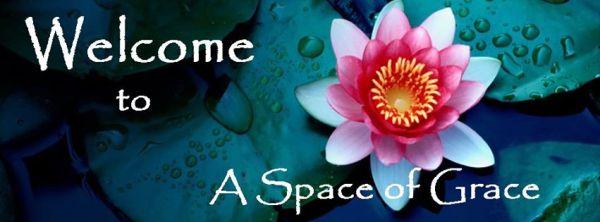
“Human beings are meaning seeking creatures.” Karen Armstrong opens her 2007, biography of the Bible with this sentence. Can I get an Amen?
I’ve spent the better part of my adult life as one of those meaning seeking creatures. I suppose, I also spent time as a child engaged in the same activity, but that search seems so distant now. The pilgrimage has yielded a few answers, and a whole lot of questions. In fact, the older I get, it seems the clearer my questions, and the fuzzier my answers. It seems I am destined to a life of wonder, and now consider my life task to be the one who wonders out loud – in print, from the pulpit, online or around the dinner table.
I have often said that my two favorite stories from scripture are Jacob wrestling with an Angel (Genesis), and the gospel narrative of Doubting Thomas (John). These narratives have aided my exploration, largely because they are ancient reminders that the quest is as old as humanity. Plus, hey, they are stories, and frankly, I am a sucker for a good story. The story can be found in scripture, in the cinema or listening to a neighbor describe his week at work. But I love Thomas and Jacob most, because they are both wrestling with questions that involve faith and doubt, and if you read Luther’s commentaries, wrestling with Christ himself. Wow!
For me, faith and doubt are two sides of the same coin. One needs both, in my view, to have the whole picture. Try putting a sliced quarter into the parking meter in Newport, Rhode Island next time you want a Venti Half-Caf Skim Latte at the local Starbucks. See how that works for ya. How can one coin be two things? It’s a paradox, and I love paradox, perhaps that is ultimately what attracted me to Lutheran theology. For it is in the Lutheran expression of the faith of Jesus that we find less either/or thinking, and more both/and concepts. We are simultaneously saint and sinner, the Eucharist is both earthly elements and heavenly promise, Jesus is both human and divine – and all of it at the same time. We are not asked to choose one or the other. Rather, we are invited to live in the tension.
In our time, there is a deep desire for surety and definition. “Why don’t you stand for something?” comes the shout from the gallery. A conviction of faith seems to credential one as a real Christian. I am sympathetic to that desire. We live in chaotic times, and clear answers, or repetitive ‘ways we’ve always done this before’ provide a sense of stability. And yet, there is another hunger. It is a desire to enter into the questions of life, faith and meaning. Entering into these questions is rooted in our Lutheran heritage. I believe our greatest gift in these turbulent times is to offer a space of grace. By offering a space for people to explore what they question, wonder and doubt – we allow for, even encourage, a precious and grace-filled discovery to occur. For I believe that is where Christ can meet people, and walk with them, just as he did with Thomas. In a culture that is hungry for meaning, for community, for peace – that’s a true gift. This is our uniquely Lutheran gift to the people in this region of New England, and indeed around the world.
Part Two - Conversation with Nones
Here is part two of our conversation with six people who have not religious affiliation, or almost don't. It runs about 30 minutes.
Midrash: A new generation seeks questions, not answers.
I'm currently at Camp Calumet, our Lutheran Camp and Conference center in New Hampshire, for their staff training week. In addition to preaching this sunday and leading the installation worship for the staff, Jim Doyle asked me to lead the staff in a discussion of faith and doubt. I leaped at the opportunity.
As the Christian narrative moves into it's 3rd millenium, I confess to being one of those advocates of exploring how our faith is being reshaped. That sentence alone will flood my email inbox. I believe it was Phylis Tickle who most recently articulated a need for Christianity to become more Jewish. What she means, and I agree with, is the need for a more conversational approach to our tradition. This is a hard move, especially for protestants, because we have been so propositional in our approach, i.e. we like to preach, and tell others the answer. What we need is dialgoue with people to explore the faith. That's a fundamentally radical new approach that impacts everything from worship and preaching to education and evangelism. (More on that another day)
Having spent more and more time with people outside of the church, I'm convinced that conversation or dialogue is the direction for us. The younger generations are also seeking a conversation. This has been evident during my time here at Calumet. I seemed to have opened the flood gates with a simple statement. "Our topic tonight is Faith and Doubt, and the most important word is the one in the middle." My intent was to affirm the value and importance of questions, of wonder, of curiosity. What happened next was not entirely unexpected, but still quite stunning. As over a hundred 17 to 23 year olds broke into small groups, and made lists of their questions and/or doubts, I realized there was a hunger in the room for honest conversation.

A significant percentage of the questions resulted from a mispercetion of the Bible. Many people, not just these camp counselors, have a literalist view of the scripture. In other words, they read the Bible as if it was a newspaper report of events or a constitutional legal document.
The doubts or "I wonder about.." lists that were generated included questions about the 7 days of creation, Jonah in the belly of the whale, Noah's Ark, some of the miracles in the Bible. These young adults were questioning the literal historicity of these events, and by implication they were doubting or wondering about the rest of the Christian narrative.
I spent Saturday morning describing the Bible not as a single book, but as a library that contained different kinds of literature - biography, novel, instruction manual, maps, advice column, song lyrics, poetry,children's book (Jonah falls in that category for me, and like the best of this kind of literature it contains profound truth). My attempt was to help broaden their view of scripture as a collection of books. Therefore, we read poetry in the bible as poetry. The mistake we often make is reading a book like Revelation as history or newspaper account, when infact that book is more like The Lord of the RIngs - a fantastic epic that's suggesting deeper meaning.
The challenge here is simultaneosuly asking the questions, and yet still maintaining or honoring our understanding of scripture as the inspired word of God. But, that's a good challenge and a contemporary challenge. If we in the Christian faith are to recover our Jewish roots, we will recover conversation and dialogue about scripture as something to be embraced not feared. The rabbis called this work the Midrash, which was the attempt to engage the stories of the hebrew Bible with not just legal or moral commentary, but narrative engagement. In other words, they told more stories about the stories.
In an odd sort of way, I was attempting to start a Lutheran Midrash at Camp Calumet. I was using the topic of Faith and Doubt to open up scripture to conversation and dialogue. As is true with all first attempts, there were mistakes and a haziness to the process. It will be better next time, but it won't be perfect then either. It's a process, that, maybe the next generation will get right. But, I'm convinced this is where we need to go.
People want to talk about Faith and Doubt, because it leads us to understanding and engagement with sacred stories, whether those stories are in the Bible or the stories of our lives.
 If this topic interests you, I have found the John Ortberg book titled "Know Doubt" (originally titled Faith and Doubt) to be tremendously helpful. It is a fairly accessible read for most people. I used this book years ago as the basis for a sermon series called "Faith and Doubt: Two Sides of the Same Coin."
If this topic interests you, I have found the John Ortberg book titled "Know Doubt" (originally titled Faith and Doubt) to be tremendously helpful. It is a fairly accessible read for most people. I used this book years ago as the basis for a sermon series called "Faith and Doubt: Two Sides of the Same Coin."


